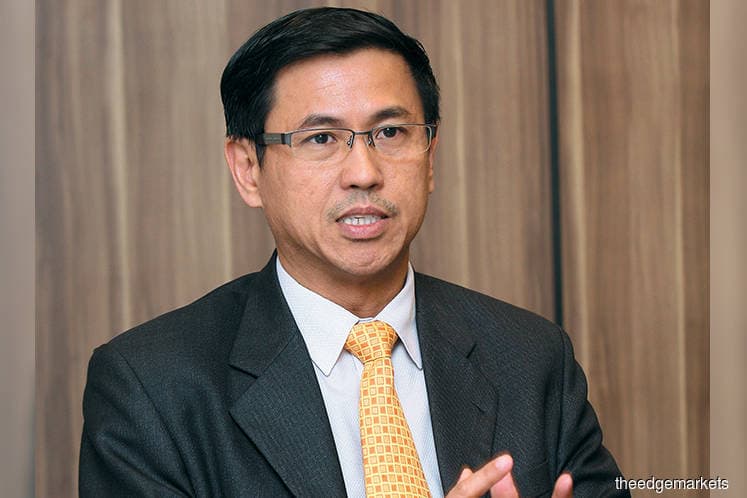
This article first appeared in The Edge Financial Daily on March 8, 2019
KUALA LUMPUR: Paramount Corp Bhd looks to achieve sales of RM1 billion for the current financial year ending Dec 31, 2019 (FY19), which is the same as its actual sales reported for FY18, driven by the RM1.3 billion gross development value (GDV) of launches slated for the year.
Its chief executive officer Jeffrey Chew (pic) said the property developer will see a steady stream of launches this year, including Phase 3 of its Utropolis Batu Kawan project in Penang, over 200 units of affordable homes in its Greenwoods township in Salak Perdana, Sepang, and the upcoming Berkeley Uptown development in Klang.
The Utropolis Batu Kawan project has seen good take-up, he said, with Phase 1 of the development comprising residential suites and commercial shop offices seeing take-up rates of 99% and 71% respectively, while the serviced apartments under Phase 2 have seen take-up of 56%.
The third phase of the project, which comprises serviced apartments with a GDV of RM222 million, is expected to be launched towards the end of the year.
Meanwhile, Berkeley Uptown, a RM1.2 billion mixed development, which includes a Sri KDU International School, serviced apartments, commercial zone, offices and public park, will be launched in two weeks and is expected to act as a catalyst for the area.
Paramount will also launch the office portion of its Atwater development in Petaling Jaya this year, which Chew said the group is slightly concerned about, given the glut in the Klang Valley office space.
However, if take-up is slow for the office units, Chew said the group could potentially get Co-labs — its co-working space venture — to occupy 60,000 sq ft of space to build awareness of the building.
“With all these projects and our record unbilled sales of RM995 million, we are quite confident we can achieve this year’s [sales] target of RM1 billion,” he said.
Paramount is also looking to further expand Co-labs and has identified three sites for them, namely the Naza Tower in Kuala Lumpur, Sekitar 26 in Shah Alam, and the expansion of its existing space in the Starling mall, Petaling Jaya.
Co-labs currently has about 400 seats across its space and aims to increase it to around 1,200 by year end.
While there is growing competition from other local and foreign co-working space players in Malaysia, Chew said demand has been growing in a big way as a lot of small and medium enterprises are no longer interested in traditional office space.
Co-working space provides convenience to smaller start-ups and companies, as tenants do not need to worry about fitting out the office with equipment or hiring security, as everything is provided for in this space.
The co-working space segment is expected to contribute RM4 million to Paramount’s revenue for FY19.
For FY18, the group posted a net profit of RM94.93 million, down 29% from RM133.65 million for the previous year, while revenue climbed 19% to RM907.67 million from RM763 million for FY17. The group posted record sales of RM1 billion for FY18. Chew attributed the lower profit to the gain on disposal recorded for the previous year, arising from the sale of its Sri KDU Campus in Petaling Jaya to Alpha REIT. Excluding the one-off item, Chew said Paramount achieved record core profit of RM151 million, up 44% year-on-year.
The developer announced a dividend of 8.5 sen per share for FY18, compared with the total of 16 sen paid for the previous year which was due to a special dividend of 7.5 sen for FY17 following the sale of the Sri KDU Campus.
The dividend announced for FY18 translated into a total dividend payout ratio of 38%, which was below the usual payout ratio of around 50% seen for prior years.
Chew said it had decided not to maintain the 50% payout ratio for FY18 as Paramount was conserving cash amid a challenging economic environment.
“A lot of companies are conserving cash because the economic environment is actually very challenging. This is not a sign that we are going to do terribly next year but we just want to be a bit more careful about our liquidity position,” he explained.
Another reason for conserving cash, he said, was due to the upcoming repayment for the group’s RM200 million perpetual bond.
“The first tranche was due on Feb 6, which we paid RM50 million. There is another payment coming up in October of another RM50 million, so we are paying RM100 million this year, and we felt that we could not use too much of our cash at this moment.
“If our liquidity position improves significantly and the uncertainties go away, we may consider returning to our 50% payout ratio,” added Chew.